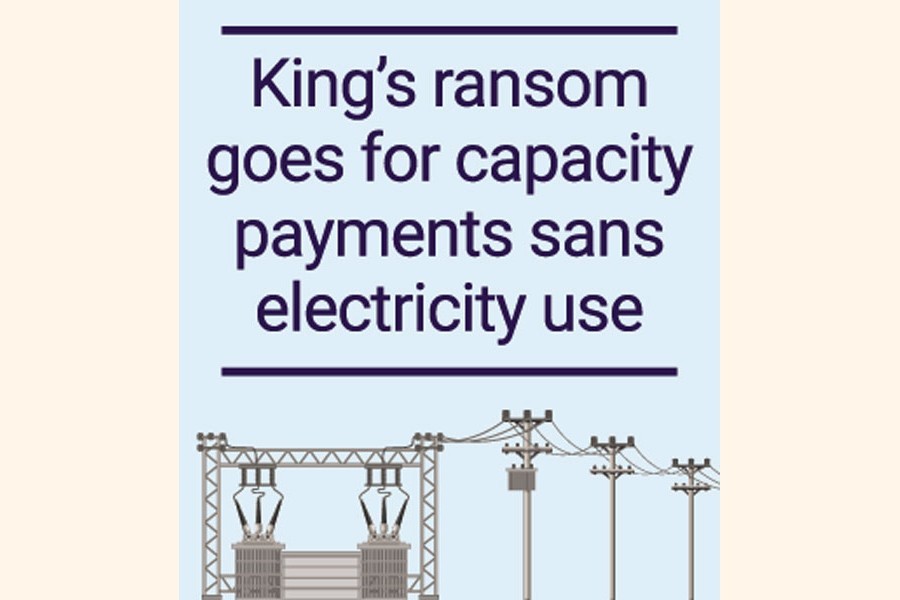Delays in building the transmission lines over major rivers have surfaced as a major bottleneck blocking timely implementation and full-capacity electricity generation from large power plants across Bangladesh, sources say.
A king's ransom has to go for capacity payments sans electricity use or half use from two megaprojects that involve China and Russia, officials say.
Like the country's largest operational 1320-megawatt coal-fired power plant at Payra in the emerging southern port hub close by the Bay of Bengal, the same sort of problem is set to delay the implementation of Bangladesh's maiden 2,400MW nuclear power plant at Rooppur, too, they said.
The nuclear-power-plant site is situated in the vicinity of two of the mighty rivers flowing down Bangladesh. And, according to the sources, three important river-crossings over the Jamuna and the Padma confront evacuation of the electricity to be generated from the currently under- construction Rooppur nuclear power plant (RNPP).
But the implementing agency of the transmission line, the state-run Power Grid Corporation of Bangladesh (PGCB), has yet to engage any contractor to carry out the jobs, it has been alleged.
Contacted over the conundrum, a senior PGCB official said the electricity- evacuation facilities of the RNPP project are being implemented with around US$1.0 billion finance from the third Indian Line of Credit (LOC).
"Under the terms of the third LOC, which was inked in October 2017, at least 75 per cent of the procurement for service-oriented projects and 65 per cent for public-works projects must be made from India," he said, adding that selection of the contractor to carry out the job is also to be done by India.
"But the Indian counterpart did not yet pick any contractor for the river- crossing jobs," he says.
They are now evaluating proposals from interested Indian firms that have dropped bids to bag the job of river-crossing of the transmission line.
It will take around two years to complete the river-crossings -two over the river Jamuna having around seven kilometres (km) each and one over the Padma of around six kms, meaning electricity evacuation from the expensive RNPP project will be delayed after completion of its construction works.
The state-run PGCB or the Bangladesh Power Development Board (BPDB) might have to count capacity payments for their failure to evacuate or purchase electricity even after completion of the mega power-plant project.
If the RNPP project had been on right track to complete construction of the power plant by its initial deadline, 2022, the capacity-payment claim might been skyrocketing, said sources.
"The construction work of the RNPP project is going on in full swing with a target to complete and commission the first 1,200mw-capacity unit by 2023," RNPP project director Dr Shawkat Akbar told the FE.
He said the second 1,200mw RNPP unit is expected to be commissioned in 2024.
Prime Minister Sheikh Hasina already inaugurated the final stage of installation of the reactor pressure vessel (RPV) at the 1,200mw unit one in October to accelerate the pace of the RNPP construction work.
Sources said the Payra 1320mw power plant is generating around 600 megawatts of electricity, around half of its installed capacity, only due to bottlenecks in electricity evacuation from river-crossing dilemma.
Although construction of the Payra coal-fired power plant, owned by Bangladesh-China Power Company Limited (BCPCL), was delayed by a year, the plant is still waiting for crossing over Padma river for full evacuation of electricity.
BCPCL is a 50:50 joint venture between Bangladesh's state-owned North-West Power Genera-tion Company Ltd (NWPGCL) and China's China National Machinery Import and Export Corporation, (CMC).
The Payra power plant initiated commercial operation with the commissioning of its second 660mw unit in early December 2020, behind around one year of the initial commissioning schedule.
The first 660mw unit of the power plant initiated commercial operation in May 2020, around eleven months after the initial schedule to initiate operation in June 2019.
"We are now charging capacity payments under terms of agreement," said BCPCL managing director AM Khurshedul Alam.
Padma Multipurpose Bridge Authority has taken the responsibility of completing the river-crossing over the river for evacuating electricity being generated from the Payra power plant.
"It might take until June 2022 to complete the river-crossing job," said a senior PGCB official, meaning the capacity-payment claim will be huge by then.
Contacted, PGCB managing director Golam Kibria expressed the hope that contractor for carrying out the river-crossing jobs for electricity transmission from the RNPP project would be appointed soon.
The electricity-evacuation system of the RNPP project will also be completed in time, he hoped.
Officials said PGCB had not carried out any significant river-crossing work on electricity-transmission system since its inception in 1996.
Before establishment of PGCB, the BPDB authority would do the job of developing electricity-transmission systems, including river-crossings.
BPDB had completed river-crossing of electricity-transmission line over the rivers Meghna, Karnafuli, Dhaleshwari, Sangu and Kushiara before the creation of PGCB.
Also, BPDB completed East-West electricity transmission with river crossing with the assistance of a Korean Contractor.


